

Integration for WordPress. Starting today WordPress publishers can easily integrate Facebook features, such as social publishing and mentions, through the new Facebook for WordPress plugin.
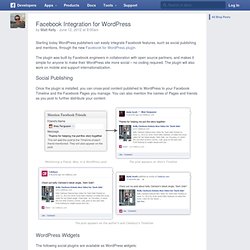
The plugin was built by Facebook engineers in collaboration with open source partners, and makes it simple for anyone to make their WordPress site more social – no coding required. The plugin will also work on mobile and support internationalization. Social Publishing Once the plugin is installed, you can cross-post content published to WordPress to your Facebook Timeline and the Facebook Pages you manage. You can also mention the names of Pages and friends as you post to further distribute your content. WordPress Widgets The following social plugins are available as WordPress widgets: TechCrunch, Buzz Media and The Next Web are already using the plugin to connect with their audiences while providing users with more engaging and personalized experiences.
Learn more or download the plugin now.
Usages. Fonctionnement. Controverses. Open Graph. Hacking. Pages fan. Facebook’s Two Deal Weapons: The Social Graph and Credits: Tech News and Analysis « U.S. Online Display Advertising Market Delivers 22 Percent Increase in Impressions vs. Year Ago. November 8, 2010 U.S.
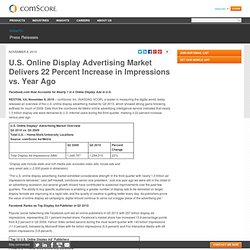
Online Display Advertising Market Delivers 22 Percent Increase in Impressions vs. Platform Policies - Facebook developers. We can analyze your app, website, content, and data for any purpose, including commercial.
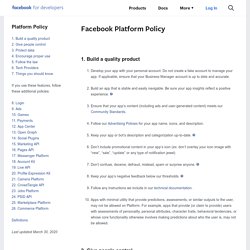
We can monitor or collect data related to your use of SDKs.We will use information we receive from you or in connection with your Platform integration in accordance with our Data Policy.You give us all rights necessary to use any API, SDK, or other technology you provide us to enable your app or bot to work, including the right to incorporate information you provide to us into other parts of Facebook, and the right to attribute the source of information using your name or logos.We may share your contact info with people who want to contact you.We may use your name, logos, content, and information, including materials you submit for review, screenshots and video captures of your app and your Facebook Page, for distribution, marketing, and promotional purposes, to demonstrate or feature your use of Facebook, worldwide and royalty-free in all formats and media. Graph API - Facebook developers.
The Graph API is the primary way for apps to read and write to the Facebook social graph.
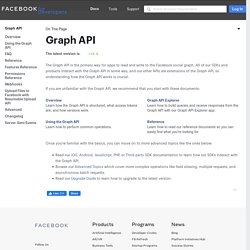
All of our SDKs and products interact with the Graph API in some way, and our other APIs are extensions of the Graph API, so understanding how the Graph API works is crucial. An Update on Encrypted UIDs. Last month, we outlined an initial proposal to address the inadvertent sharing of User IDs (UIDs) via the HTTP Referral header.
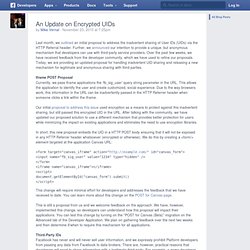
Further, we announced our intention to provide a unique, but anonymous mechanism that developers can use with third-party service providers. Over the past few weeks, we have received feedback from the developer community, which we have used to refine our proposals. Today, we are providing an updated proposal for handling inadvertent UID sharing and releasing a new mechanism for legitimate and anonymous sharing with third-parties. Iframe POST Proposal Currently, we pass iframe applications the ‘fb_sig_user’ query string parameter in the URL. This allows the application to identify the user and create customized, social experience. Our initial proposal to address this issue used encryption as a means to protect against this inadvertent sharing, but still passed this encrypted UID in the URL. Facebook Messages, le piège qui va asseoir la suprématie de Facebook » Article » OWNI, Digital Journalism. Plus maligne que Google Wave, la nouvelle messagerie lancée hier est faite pour attirer dans le giron de Facebook les gens qui ont un mail mais n'utilisent pas encore le réseau social.
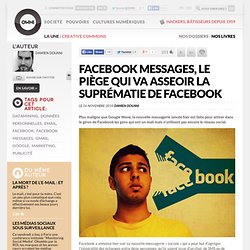
The Facebook Drama "The Social Network" Won't Show You. I think I can safely say that The Social Network is not the feel-good movie of the year – certainly not for Mark Zuckerberg, or for the dozens of exceptionally talented men and women who created Facebook.
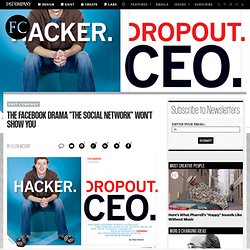
They were, and are, brilliant, hardworking and imaginative people who, mostly by design and occasionally by lucky accident, managed to survive the uniquely fraught early moments of an online start-up and the more established dangers of real-world Valley venture capital. It was a swirl alright, but not the way the film would have you think. There are, of course, exceptions to the exceptional: Eduardo Saverin and the Winklevii. (The goofy name that Zuckerberg stamped on the preternaturally entitled Winklevoss twins appears to be true. Here’s the sour irony: After all the fretting about online privacy and reputation management, two of the slowest, least nimble and most expensive media—a paper book and a feature film—have left the biggest scar.
Why Facebook's New Groups Will Change the Way You Use Facebook. People use Facebook a lot already, but the addition of the new Groups feature today will lead them to use it even more - and in different ways.
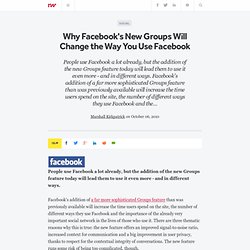
Facebook's addition of a far more sophisticated Groups feature than was previously available will increase the time users spend on the site, the number of different ways they use Facebook and the importance of the already very important social network in the lives of those who use it. There are three thematic reasons why this is true: the new feature offers an improved signal-to-noise ratio, increased context for communication and a big improvement in user privacy, thanks to respect for the contextual integrity of conversations. The new feature runs some risk of being too complicated, though. Signal to Noise. How Facebook’s new Groups could help defeat Google. Updated.
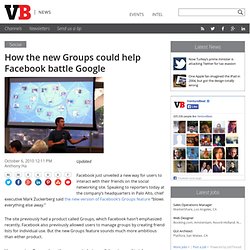
Facebook to announce how it will draw more attention to social games. Not all players are the same!
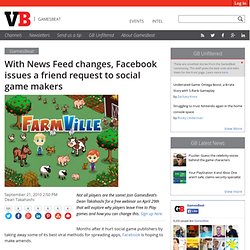
Join GamesBeat's Dean Takahashi for a free webinar on April 29th that will explore why players leave Free to Play games and how you can change this. Sign up here. Months after it hurt social game publishers by taking away some of its best viral methods for spreading apps, Facebook is hoping to make amends. The company is planning to announce today it will make changes to its its News Feed, the system which displays updates from friends, so that aficionados of social games like Zynga’s FarmVille can receive more notifications about their friends’ gameplay. That will help game companies return to the days of using Facebook’s friend activity — a powerful driver of traffic — to market their games. New Facebook Ad Serving Algorithm Causes Drastic Results. Wednesday, all over the world, online marketers experienced drastic changes in their Facebook advertising performance.
Most advertisers saw large drops in both impressions and clicks. The bigger the ad spend, the larger the drop, some as high as 60%. There are many factors that go into advertising performance, and some immediately checks come up negative: Has the volume suddenly dried up? Are they all on vacation? All signs point to Facebook changing the way they serve ads. While you may think it a bit odd for Facebook to suddenly change the way they do business, keep in mind they continually change their interface- much to the (dis)like of the majority of their users. Facebook Statistics, Application Statistics, Page Statistics. Facebook Live : ce que cela va changer pour les marques.
Fbnumbers.jpg (630×4860) Le nouveau J’aime de Facebook s’affiche maintenant sur plusieurs lignes. Facebook a effectué un changement dans la façon dont apparaissent les « J’aime/Like » effectués sur des sites tiers, sur notre profil. Si vous cliquez sur le bouton « J’aime » sur un article de blog par exemple (essayez avec celui-ci tiens :-), vous verrez apparaitre sur votre profil plusieurs lignes descriptives avec deux liens (l’un vers l’article, l’autre vers la page d’accueil du site) : Alors qu’auparavant la même action sur le bouton Like, s’affichait sur une seule ligne : Le changement fait donc apparaître l’action d’aimer une page exactement de la même manière que le faisait un clic sur le bouton « Partager/Share ».
Et Facebook a déjà enlevé ce dernier de la documentation, ce qui laisse à penser qu’il n’y aura plus que le bouton J’aime (Like) à l’avenir, et que le bouton « Partager (Share) » va disparaître progressivement. Tant mieux car l’action du « J’aime » consiste juste en 1 seul clic (contrairement au « Partager » où il en fallait 2 minimum).